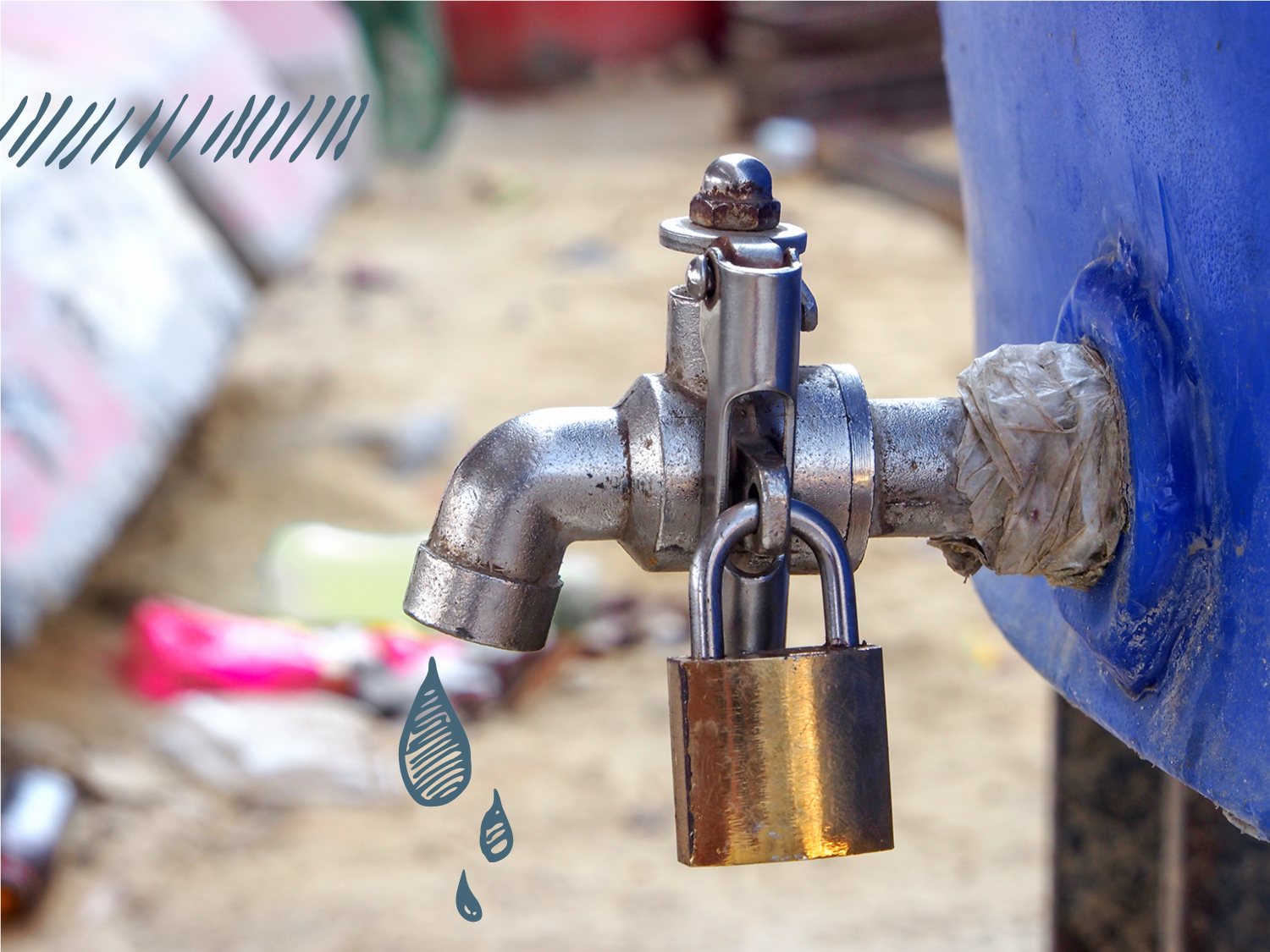Water, sanitation, and hygiene (WASH) services are too often targeted as part of war strategies during armed conflicts, putting many people in dire situations.
Strengthening the governance, implementation and monitoring of WASH services is key for long-term sustainability.
WASH in conflicts
Conflicts are one of the main obstacles to the achievement of universal access to safely managed water, sanitation, and hygiene (WASH). Conversely, water insecurity can contribute to outbreaks of violence, increase their duration, and undermine efforts to consolidate peace. The effects of climate change on access to water, water allocation, and water use exacerbate episodes of violence. Often the most vulnerable regions simultaneously endure the greatest impacts of climate change and outbursts of violence.
The impacts of unsafe water, sanitation, and hygiene on people living in fragile, conflict-affected settings are staggering. According to UNICEF, children living in the midst of protracted conflicts are, on average, more likely to die from diarrheal disease linked to unsafe water and sanitation than from bombs and bullets.
Poor WASH governance and conflicts are deeply interrelated. Failure to provide communities with basic water services, to protect them from water-related disasters, and to protect water sources from disruptions give rise to water insecurity and violence. The perceptions of corruption, exclusion, and inequity are major drivers of discontent. Even WASH service delivery projects can create tensions or worsen pre-existing conflicts when interventions do not pay enough attention to deep conflict drivers.
Ultimately, providing better services promotes stability and helps reduce disparities. Reinstating access to WASH can enhance the prospects for peaceful, stable societies. It also helps rebuild confidence in government institutions as they demonstrate their capability and willingness to meet the needs of communities.
But it’s not just services that contributes to peacebuilding – it’s the manner in which they are delivered. Carefully designed WASH interventions can act as important catalysts for peace in conflict-affected areas. Inclusive and participatory governance of services has a key role in supporting more cohesive communities.
Steps to peace through WASH
1. Make peace- and conflict-informed interventions for WASH resilience
In fragile contexts, service resilience can only be achieved if conflict threats are addressed as a core part of WASH interventions. Priority setting should be based on a good understanding of security threats to WASH in order to “do no harm” (such as exacerbating existing conflicts), while “doing more good”, i.e., building more cohesive and peaceful communities. Conflicts are included in the Global WASH Sector Resilience Index developed by SIWI and UNICEF to track the level of resilience of national WASH systems to multiple risks. SIWI has designed a tool to prevent conflict threats at the same time as we build WASH climate resilience.
2. Understand the specific approach to WASH accountability in fragile contexts
Understanding the existing accountability frameworks and the political nature of service delivery in fragile contexts is essential. There is a need to rebuild trust among the key national stakeholders (citizens, service providers, regulators, and policy makers) while improving the quality of services. SIWI developed a concept note on WASH accountability in fragile states to address governance issues in such contexts.
3. Promote service delivery modalities that contribute to building peace
WASH service delivery can support greater collaboration and reinforce cohesion by providing support to aid communities in working together or with others to improve essential services. SIWI put forward a tool to improve service delivery models which provides examples of collaboration and adapts service modalities to the specific needs in fragile contexts.
4. Leverage capacities of women and youth
Women and young people are well positioned and equipped to address WASH-related conflict constructively and build and sustain peace. They can contribute their gender and age differentiated experience, vision, and analysis on conflicts. Women’s groups collaborating across ethnic lines or youth centres can act as spaces of cooperation around commonly recognized “goods” such as water. SIWI promotes a greater inclusion of women, youth, underrepresented, underserved, and marginalized groups, and people in vulnerable situations in WASH solutions in fragile contexts.
5. Build capacities from local to national
It is crucial to ensure that the capacities for preparedness and emergency response are embedded in decentralized and national development plans, structures, and capacities, and supported by appropriate information systems. To build stakeholder capacities, from local to national, and to minimize WASH system underperformance in conflict contexts, anticipative and absorptive capacities should be strengthened. In parallel, to maximize WASH system performance, preventative and adaptive capacities should also be strengthened. SIWI is developing a capacity development methodology to support countries in this regard.
6. Promote integration of development cooperation and humanitarian solutions
Armed conflicts are increasingly protracted. Such conflicts require an adapted WASH response, giving way to more realistic policies. These policies should recognize the need for both emergency aid and long-term solutions where people are struggling to survive armed conflicts that last for decades. In addition, there is a need to invest more in preparedness, conflict prevention, and building sector resilience, with a more long-term, risk-informed approach. Humanitarian support and development support should work more closely together. From the humanitarian end, long-term sustainability should be an essential part of the strategy, while from the development end, disaster preparedness and risk reduction require further attention. Disaster risk reduction, including preparedness, is needed to anticipate a potential crisis eruption; but today, less than 0.5% of Official Development Assistance is spent on preparedness. SIWI advocates for improving the nexus approach, combining development and humanitarian contexts for peaceful cooperation.
7. Address the plight of forcibly displaced populations
An arsenal of overlapping and complementary policies and measures can be put in place to improve the livelihoods of persons displaced by conflicts or climate disruptions. SIWI promotes the preparedness of movements of populations and the protection of these groups from violence as conditions to decrease the vulnerability of the WASH sector to climate hazards in fragile contexts.
8. Address farmers-herders conflicts and access to water through WASH governance
The frequency, intensity, and geographical scope of conflicts that pit nomadic and semi-nomadic herders against each other and against farmers have increased in the past decades. Violence has intensified with governance failures to deal with water scarcity and contamination, insecurity, and social and environmental injustices. SIWI has formulated recommendations on how to address farmer-herder conflicts in its upcoming policy brief on animals and WASH.












